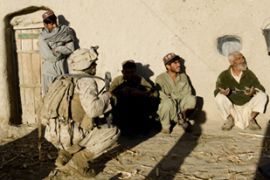Obama to reveal Afghan war plan
US president expected to announce deployment of 30,000 more troops in exit strategy speech.

“Taken together, these additional American and international troops will allow us to accelerate handing over responsibility to Afghan forces, and allow us to begin the transfer of our forces out of Afghanistan in July 2011,” Obama will say.
|
“It will be clear to the Afghan government – and more importantly, to the Afghan people – that they will ultimately be responsible for their own security” Barack Obama |
In addition he is expected to say that US forces continue to “advise and assist” Afghanistan’s security forces in the longer term.
But, he will add, “it will be clear to the Afghan government – and more importantly, to the Afghan people – that they will ultimately be responsible for their own security.”
Robert Gibbs, the White House spokesman, said on CBS television: “We’re going to accelerate going after al-Qaeda and its extremist allies.
“We’re going to accelerate the training of an Afghan security force, the police and an army, because we want to as quickly as possible transition the security of the Afghan people over to those national security forces in Afghanistan.”
Obama’s decision comes at the end of a 92-day US administration review of the war in Afghanistan.
Military personnel are expected to be deployed to Afghanistan by Christmas, with larger groups to follow over the course of six months.
Call to Karzai
Over the last few days, Obama has informed world leaders, prominent administration officials and military advisors of his plan in a series of meetings.
Ahead of the speech, Obama was also said to have had an hour-long video conference call with Hamid Karzai, the Afghan president.
Obama’s announcement is expected to include an exit strategy for the war, which has grown unpopular with the American public.
US public opinion polls show that 25 per cent more Republicans than Democrats favour sending additional troops.
Peter Galbraith, the former UN deputy special representative to Afghanistan, told Al Jazeera: “I’m against this because it is really part of a counter-insurgency strategy, and a counter-insurgency strategy requires a credible local partner.
| In depth |
|
|
“In these circumstances, President Karzai is not such a partner so I don’t think these additional troops can accomplish the mission that they are being given.”
Galbraith was sacked by the UN following his criticism of the August election in Afghanistan which he said was marred by fraud but returned Karzai to power after a runoff with his rival was cancelled.
David Chater, Al Jazeera’s correspondent in Kabul, said Obama would try to make his Afghan plans more palatable to the public by emphasising that the extra troops will be used to provide mentoring and support for the Afghan security forces.
“Every war throws up some ugly jargon and the latest we’re hearing from the White House is that the policy will be a ‘population-centric strategy’,” Chater said.
“What that essentially means is that these new troops will be sent in to guard the main areas of the population in Afghanistan.
“The problem facing Stanley McChrystal [the US and Nato commander in Afghanistan] is that the areas where the Taliban has been operating in the south and east of the country have now spread to the west and especially to the north.
“This threatens the supply-lines of the troops here and it means that the troops on the ground are going to be thinly spread if you try to tackle the whole of the insurgency across the whole of the country.
“That’s why they’re going to fall back on the main centres of population. To try and bring some sort of security and normality, build up the economic infrastructure – give the people in those centres a bit of a normal life and hope that they can build on that policy from there.”
Public view
Pentagon officials hope that Nato member states will supplement the US increase with up to 10,000 of their own troops and trainers – pushing the overall number of extra troops close to 40,000.
| Support for the war |
|
Sources: Washington Post, AngusReid Strategies, Tagesspiegel, Lowy Institute |
There are more than 100,000 international troops in Afghanistan – 67,000 from the US, with the UK, Italy, Germany among those contributing.
Jamie Rubin, the former US state department spokesman, told Al Jazeera that with the troop increase “they will be … capable of dealing with the Taliban resurgence”.
“If this level of troops and commitment had been applied to Afghanistan all along, this would not have been necessary,” Rubin said.
“It’s very unique in Afghanistan. It’s the only war in modern history in which every major power in the world has said they support the US war in Afghanistan.”
Of the Afghan public’s reaction to the strategy, Chater said: “The greatest feeling I get from people across Afghanistan is they feel that more American troops on the ground will cause more civilian casualties.”
Haroun Mir, a political analyst, told Al Jazeera: “Probably in order to break down the momentum of the Taliban we need a military surge, but that would not be sufficient.
“We need Obama to talk about Pakistan. Because it is a haven for the Taliban … so we need to hear his strategy there.
“He should request that Pakistan will go after the Taliban leadership there.”
Marwan Bishara, Al Jazeera’s senior political analyst, said: “It is a continuation of more of the same so-called national security state policy. If force doesn’t work, more force will work.
“There isn’t much of a change in the mindset of finding war as a solution to security challenges.”
The US invaded the country in 2001 to remove the Taliban – who were accused of harbouring al-Qaeda operatives – from power.


